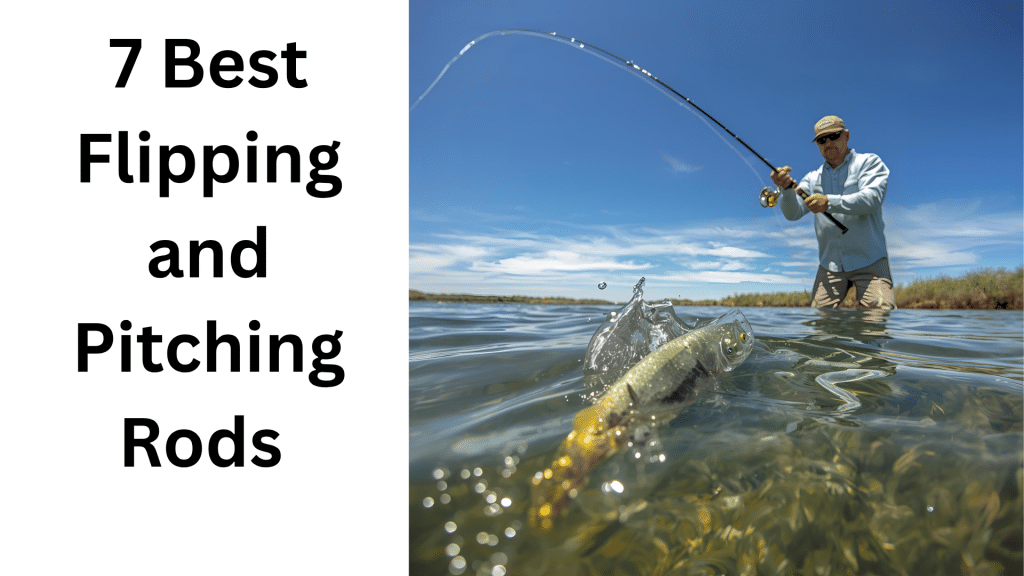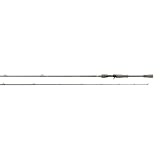Flipping & pitching is close-quarters, power fishing. Your rod has to do two things at once: load quickly for short, accurate lobs, and shut off with serious backbone to winch fish out of cover. In practice, that means a fast tip with a stout mid/butt, tip-light balance, Heavy–XH power, and a handle you can leverage under your forearm. Below are seven rods plus what each is best at, key tech, pros/cons, and a quick comparison table so you can pick with confidence.
features & requirements (quick reference)
-
Must-have: H/XH power, fast/extra-fast tip, high-quality graphite, durable guide train, full rear grip, exposed seat, tip-light balance.
-
Nice-to-have: Textured/flare butt, lock-down nut that doesn’t back off, non-micro runners for leader knots, lifetime/solid warranty.
-
Avoid: Broomstick with no tip (kills accuracy), ultra-micro guides if you run leader knots, tip-heavy builds that fatigue your wrist.
Quick chooser (one-line cheat sheet):
-
Docks/laydowns (accuracy first): 7’2”–7’4” Heavy / Fast
-
Mixed cover (do-it-all): 7’4”–7’6” Heavy / Fast
-
Thick reeds/mats (winch power): 7’6”–7’10” Heavy–XH / Fast
1) Dobyns Champion XP DC766FLIP — 7’6″ Heavy / Fast
Why it’s great for flip/pitch: Purpose-built “FLIP” model with the classic 7’6″ length, fast tip for precise pitches, and a powerful shutoff to move fish now—not later.
Notable tech & specs: modulus graphite blank with Kevlar wrapping, Fuji reel seat, full cork handle (~15.25″), rated about 14–30 lb line and 3/8–2.5 oz lures.
Best for: All-around flipping & pitching in mixed cover (wood + grass), 3/8–1¼ oz jigs/T-rigs.
Pros: Proven series, crisp tip recovery, comfortable full cork for all-day work.
Cons: Traditional guide sizing (not micro); premium price.
2) Daiwa Tatula Elite “Pitching” Casting Rod
Why it’s great for flip/pitch: Tatula Elite’s Pitching models are tuned with faster tapers that unload short casts on target and keep hooks pinned in close.
Notable tech & specs: X45 Bias graphite (twist-resistant 45° weave), SVF Nanoplus resin system for sensitivity, and Air Sensor reel seat; Tatula Elite lineup includes technique-specific Pitching/Flipping models around 7’3″–7’6″.
Best for: Dock and short-range pitching with ½–1 oz jigs/T-rigs where accuracy matters.
Pros: Ultra-crisp blank; light in hand; modern component set.
Cons: Model options vary by dealer; verify exact length/power before buying.
3) Phenix Virtus Blue Diamond — 7’6″ Heavy / Fast (FLIP/Pitch)
Why it’s great for flip/pitch: Labeled FLIP/Pitch, this one blends sensitivity up top with a stout midsection—great combo for short, controlled under-hand casts and hard hook-sets.
Notable tech & specs: Proprietary carbon fiber + graphite blended blank, Fuji reel seat, SeaGuide guides.
Best for: Sparse to moderate grass, reeds, and wood; ½–1½ oz jigs, compact punch rigs.
Pros: Fast, crisp feel; quality hardware for braid.
Cons: Fewer length/power variants than some big brands.
4) Lew’s Custom Lite “Pitching Stick” — 7’4″ Heavy / Fast
Why it’s great for flip/pitch: Slightly shorter at 7’4″ for tight quarters and skip-to-spot pitching while keeping heavy-cover power.
Notable tech & specs: HM85 graphite blanks, Full Contact casting reel seat for direct blank feel, Winn Dri-Tac ProWeave split grips, stainless frames with titanium oxide inserts. The “Magnum Pitchin’” spec runs 7’4″ H / Fast, ~15–65 lb line and ½–2 oz lure windows (check seller).
Best for: Docks, overhangs, laydowns; ⅜–1¼ oz jigs/T-rigs where accuracy > reach.
Pros: Grippy handle in wet/hot conditions; lively tip for precision.
Cons: Guide inserts are titanium-oxide (good, not top-tier ceramics).
5) Falcon Lowrider LFC-72HH “Flippin’ Stik” — 7’2″ Heavy
Why it’s great for flip/pitch: Shorter, stouter, heavier pitching rod that shines at target-casting into tight cover with quick hook power.
Notable tech & specs: Technique-specific Lowrider with the original low-profile, small-diameter Fuji K-Frame + FazLite guide concept; typical spec for this model is 7’2″ H / Fast, 15–30 lb line, ½–1½ oz lures.
Best for: Pin-point dock work, bushes, and short “flip-to-bite” presentations.
Pros: Nimble and accurate; guide train reduces line slap.
Cons: Less reach for long flips; smaller guides can be tighter with big braid knots.
6) Dobyns Kaden KD765FLIP — 7’6″ Med-Heavy Flip / Fast
Why it’s great for flip/pitch: Labeled Flippin and balanced for day-long work—slightly lighter power if you want more tip life for accuracy and a bit more versatility.
Notable tech & specs: 7’6″, Fast, MH Flip, 12–25 lb line, ¼–2 oz lure, high-modulus graphite with added Kevlar reinforcement; full Portugal cork handle.
Best for: Mixed cover with ⅜–1 oz payloads where you still want a forgiving tip.
Pros: Friendly price vs. Champion; comfortable cork; versatile rating.
Cons: Not as “brute force” as true H/XH punch sticks.
7) KastKing Royale Legend Pro — 7’8″ Flippin’ (2-pc), H / Fast
Why it’s great for flip/pitch: Budget-friendly, technique-named Flippin’ model with legit hardware for braid and short-range control.
Notable tech & specs: KastFlex IM7 graphite blank with nano resin, Fuji stainless K-frames w/FazLite inserts, SlipLock high-traction handles, and PTS Power Transition System; the flippin’ variant is labeled 7’8″ H / Fast (2-pc).
Best for: Anglers wanting reach for flipping reeds/grass without premium pricing.
Pros: Lots of tech per dollar; travel-friendly 2-pc build.
Cons: Heavier than boutique sticks; verify line window (varies by listing).
Quick comparison table (flip/pitch at a glance)
| Model | Length | Power / Action | Key tech | Typical payload window | Best used for |
|---|---|---|---|---|---|
| Dobyns Champion XP DC766FLIP | 7’6” | Heavy / Fast | Modulus graphite, Kevlar wraps, Fuji seat, full cork | ~14–30 lb; 3/8–2.5 oz | All-around flipping & pitching in mixed cover. |
| Daiwa Tatula Elite Pitching | ~7’3” | Heavy / Fast | X45 Bias, SVF Nanoplus, Air Sensor seat | (varies by model) | Accuracy pitching, docks & short-range targets. |
| Phenix Virtus Blue Diamond (FLIP/Pitch) | 7’6” | Heavy / Fast | Proprietary carbon/graphite blend, Fuji seat, SeaGuide guides | (varies) | Flip/pitch in reeds, grass, wood—braid-friendly. |
| Lew’s Custom Lite Pitching Stick | 7’4” | Heavy / Fast | HM85 blanks, Full Contact seat, Winn Dri-Tac grips | ~15–65 lb; ½–2 oz | Tight quarters, skipping, precise pitching. |
| Falcon Lowrider LFC-72HH “Flippin’ Stik” | 7’2” | Heavy / Fast | Fuji K-Frame + FazLite low-profile guide layout | ~15–30 lb; ½–1½ oz | Close-in target work; faster hook power. |
| Dobyns Kaden KD765FLIP | 7’6” | MH Flip / Fast | High-mod graphite, Kevlar reinforcement, cork | 12–25 lb; ¼–2 oz | Versatile flip/pitch when you want more tip life. |
| KastKing Royale Legend Pro Flippin’ (2-pc) | 7’8” | Heavy / Fast | IM7 + nano resin, Fuji FazLite K-frames, SlipLock, PTS | (varies; model-specific) | Budget reach for reeds/grass; travel-friendly. |
How to pick the right flip/pitch rod (fast, foolproof)
1) Match cover & bait weight first
-
Docks/laydowns/light grass: 7’2”–7’4” Heavy / Fast (accuracy > reach).
-
Mixed cover (most lakes): 7’4”–7’6” Heavy / Fast (the do-it-all).
-
Thick reeds/mats/punching: 7’6”–7’10” H–XH / Fast (max leverage).
2) Check the payload window
-
Pitching: runs clean at 3/8–1 oz.
-
Flipping/punching: look for up to 1.5–2 oz headroom.
3) Feel for a tip-light balance
Mount your reel—if the tip wants to dive, you’ll fight fatigue and lose accuracy.
4) Guides & knots
If you run braid-to-leader, avoid ultra-micro runners. Size #5–6 (or K-frame) runners pass knots and shed wraps better.
5) Handle & ergonomics
A full or long rear grip (≈11–14″) locks under your forearm for leverage. Sticky grips (Winn/SlipLock/cork) reduce slip-ups when you’re sweaty or wet.
6) Blank behavior
You’re after fast tip recovery (for quiet entries) and a firm shutoff so fish don’t bury you after the bite.
7) Right power for your line
-
Braid 50–65 lb: Heavy–XH, stout guides.
-
Fluoro 17–25 lb: Heavy with a little tip to protect knots on short swings.
mistakes anglers often make
-
Going too stiff for pitching → accuracy suffers, you pull baits away.
-
Too short for flipping → lose reach/line control in reeds.
-
Undersized guides with braid-to-leader → knot hangups cost fish.
-
Under-gunned power in grass → you’ll bury fish instead of moving them.
Flipping and pitching reward anglers who match cover + payload to a rod with the right length, power, action, and balance. If you remember nothing else, remember this: a fast, responsive tip puts your bait on a dinner plate; a stout mid/butt turns bites into fish in the boat.
My other article on flipping and pitching, I hope it will help.
Best flipping reels (Pitch/Flip models)
Flipping & punching: everything you need to know








